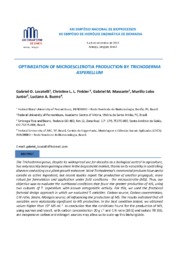Optimization of microesclerotia production by Trichoderma asperellum.
Optimization of microesclerotia production by Trichoderma asperellum.
Author(s): LOCATELLI, G. O.; FINKLER, C. L. L.; MASCARIN, G. M.; LOBO JUNIOR, M.; BUENO, L. A.
Summary: The Trichoderma genus, despite its widespread use for decades as a biological control in agriculture, has only recently been gaining a share in the biopesticide market, thanks to its versatility in controlling diseases and acting as a plant growth enhancer. Most Trichoderma's commercial products have aerial conidia as active ingredient, but recent studies report the production of another propagule, more robust for formulation and application under field conditions - the microsclerotia (MS). Thus, our objective was to evaluate the nutritional conditions that favor the greater production of MS, using two cultures of T. asperellum with known antagonistic activity. For this, we used the fractional factorial design approach in which we evaluated 5 variables: Carbon source, Carbon concentration, C:N ratio, Strain, Nitrogen source, all influencing the production of MS. The results indicated that all variables were statistically significant to MS production. In the best condition tested, we obtained values higher than 104 MS mL-1. In conclusion that the conditions found for the production of MS, using sucrose and lyscell, with carbon concentration 20 g L-1 and C:N ratio (10:1) and isolate TR 356, are inexpensive carbon and nitrogen sources may allow us to scale-up this biofungicide.
Publication year: 2017
Types of publication: Paper in annals and proceedings
Unit: Embrapa Rice & Beans
Observation
Some of Embrapa's publications are published as ePub files. To read them, use or download one of the following free software options to your computer or mobile device. Android: Google Play Books; IOS: iBooks; Windows and Linux: Calibre.
Access other publications
Access the Agricultural Research Database (BDPA) to consult Embrapa's full library collection and records.
Visit Embrapa Bookstore to purchase books and other publications sold by Embrapa.

